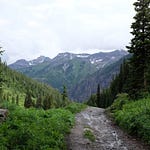Good evening.
I began developing editorial ideas for this newsletter at the end of 2020. As I reflected on the fallout of the pandemic and what it takes for humanity to build a more resilient, more abundant future, I couldn’t help thinking about space.
That’s because if nothing else, the pandemic has reminded us that we under-appreciate tail risk. While climate change activists often implore the world to reduce carbon emissions or consume earthly resources more frugally, the pace of population growth will eventually catch up. The likelihood of an asteroid striking the Earth seems minute, but the consequence would certainly be existential. And, the 2015 Hugo Award-winning novel The Three Body Problem paints perhaps an overly dark and deterministic vision of human encounter with otherworldly intelligence, but such view was held also by the late seriously minded physicist and cosmologist Stephen Hawking. Meanwhile, the interstellar object Oumuamua in real life continues to attract controversy even among the scientific community whether it was just space rock or something more.
A helpful way to think about space is to contrast different visions advocated by the first and second richest men in the world at the moment. The high-profile Elon Musk sees an interplanetary future for humanity, where we have a “Planet B” in the event the Earth suffers some irreparable damage. More secretive Jeff Bezos, on the other hand, imagines heavy industries and other polluting activities pushed out to orbit or perhaps the Moon, and the Earth “zoned” as residential and recreational, much as national parks are now protected. If you are interested in learning more about what Musk and Bezos have done, I recommend the book The Space Barons by The Washington Post staff writer Christian Davenport.
Of course, that private entrepreneurs could take a crack at space at all is a relatively recent phenomenon, though Musk and Bezos are preceded by other space buffs such as Paul Allen and Richard Branson to name just two. What’s made it all possible, though, is a parallel push at the national and international agency level, such as NASA and ESA, to deliberately allow the private sector greater access to near-earth space. These agencies could then orient towards more deeper-space missions. Between the agencies and the private sector, there is also active policy framework discussions to promote a new economy that is robust and fertile for new technology and wealth creation.
This latter topic, which has become known as the New Space, is where my primary interest lies. In future issues of the Ion Drive, I will delve into some of the less reported companies and people I find fascinating. For now, let’s conclude this introduction with recent words of Mark Hopkins and Rod Pyle of the National Space Society. According to Hopkins, a Harvard- and Caltech-educated economist:
The vast majority of resources in the solar system lies in space rather than on the Earth. This is true of both materials and energy… The sun produces ten trillion times more energy than what is currently used by the human race. If we could bring just a small percentage of that to Earth, we will have all the energy we need, and it’s a clean, inexhaustible resource. There is vast potential for increasing the size of the human economy by tapping into these resources. Half of the human race currently lives at an income which is more than a factor of twenty-five below the American average. Two billion people are so poor they don’t even have electricity. Space offers the resources to increase the global standard of living well beyond what it is in the United States today, and to do this in a way that is environmentally benign. Space makes possible a prosperous and hopeful future for all of humanity.
Rod Pyle, award-winning science writer and editor of Ad Astra magazine, continues:
The reasons [for space exploration] range from technological advancement that can improve our daily lives, to economics, and even the satisfaction of our basic impulse to explore. Some even posit the movement of humanity off Earth as a hedge against a catastrophic, species-ending event on Earth.
If you’ve been forwarded this update, please consider subscribing by clicking on the button below. Thank you for your support.
From Aspen, Colorado 🇺🇸
Victor











